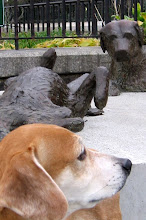Learning about our ancestors -- where they came from, how they lived, what changed their lives, and how their experiences have influenced our lives -- makes us human, and may even help make us humane. Whether we learn at a grandparent's knee or through reading, research, travel, or chance, there's always more to know, and with that comes the endless opportunity to try to understand ourselves and why we do the good, the less good and worse, the crazy, and the incomprehensible.
Our domestic dogs also have ancestors. They've got extended family throughout the canine world, and every member of that family has a story to tell. Study the body language and pack behaviors of the wolf; do you recognize your dog's mannerisms and actions?
The range of literature is as wide and varied as the global territory of nondomestic canines, from the wolf to the coyote, jackal, dingo, fox, fennec, and wild dog.
One can focus on the natural history of each subspecies or thrill to first-person accounts of encounters in the wild. Folklore and fable have much to tell us, from Native America to the Indian subcontinent and most every other culture, too. For adults and youngsters, novelists around the world have imagined dogs’ wild cousins in renowned tales and lesser-known works that are well worth reading and collecting. Children’s literature, especially picture books, is an enchanting collectible choice. The Big Bad Wolf, who appears in so many retellings that one can make his story a mini-collection of its own, is just one classic character worthy of attention.
The more we learn about our dogs' origins and how their distant cousins have lived, and thrive or struggle to survive today, the less likely we are to forget that no matter how close to us dogs are, they are first and foremost their own distinct selves. They need dog life as well as life as members of our families. The more we know about the dog life they need, the better able we are to provide at least a humble portion of it. Think of it as the treat that isn’t eaten; serving it is our reward.
Subscribe to:
Post Comments (Atom)

No comments:
Post a Comment